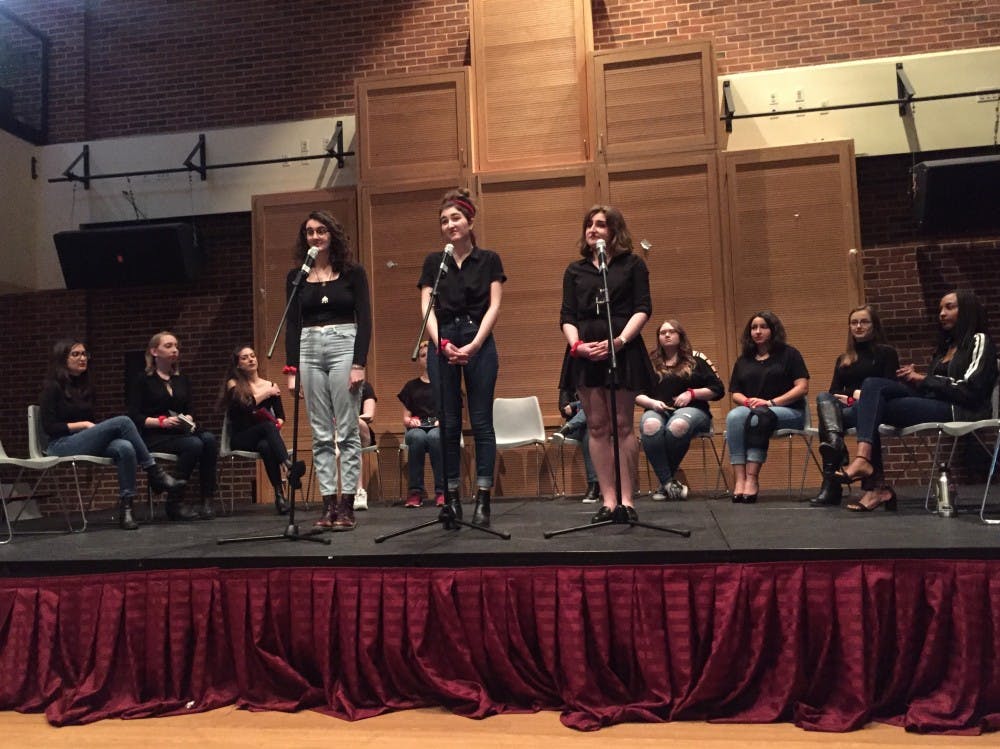Thirteen empowered UR women commanded the stage in matching red wristbands on the evenings of Feb. 15 and Feb. 16 to celebrate the 20th anniversary of The Vagina Monologues.
The color red symbolizes passion, sacrifice and solidarity, Kexin Li, director of the production, said.
“Vagina Monologues for me is a platform to voice my own concerns for the community,” Li said. “It’s to reclaim humanity for marginalized groups.”
The annual benefit production held in Tyler Haynes Commons is part of the global V-Day campaign to stop violence against women and girls. The room was energetic both nights, with Friday’s show nearly selling out.
The performance covered an array of topics: body hair, sexual violence, heterosexual relationships, trans identity and the intersection of gender, race and class.
“We also tried to add more elements of UR into our production this year so that audiences could speak to the production more,” Li said. “There’s just really hilarious fun facts about trying to have sex in a college dorm.”
In the piece "The Woman Who Loved to Make Vaginas Happy," the cast performed different types of moans which prompted audience laughter with references to familiar campus places such as X-lot and Gray Court.
Sara Messervey, the financial chair of The Vagina Monologues executive team who performed the piece, began the performance by stripping from a black cloak held together with a black ribbon to a mesh lingerie tank top.
“There’s something just really powerful about feeling that uninhibited on stage and really connecting with the character that way,” Messervey said in response to her strip. “Also, the moaning in general is always my favorite part of the show every year.
“I love seeing women moan on stage with no inhibitions, no concern about what they will look like or sound like. It’s beautiful.”
When asked what the 20th anniversary of The Vagina Monologues means to her, Messervey said it was meaningful that people had the opportunity to hear these stories because there was a time when it was not acceptable to say these things out loud.
“I know for a fact that Dorothy Holland [associate professor of theatre and women, gender and sexuality studies] had to fight to get the University of Richmond to show this production because a lot of investors were really upset about the show,” Messervey said. “I think that especially on this campus, we see a lot of denial of women’s experiences and a lot of discomfort with the idea of vaginas in general.
Enjoy what you're reading?
Signup for our newsletter
“We have a very big dick culture where they’re just talked about all the time. It’s kind of amazing to stop and say, ‘What about vaginas?’”
Cory Schutter, a senior double-majoring in rhetoric and communications and WGSS, has been to the show three years in a row because he enjoys being in a space where people feel empowered.
“I just kept thinking throughout the entire show, we really don’t hear enough stories about women,” Schutter said. “I think it’s important for UR to have this because it really brings women’s issues to a really public venue. Location-wise, everyone walking by The Pier can hear. So, it’s really pushing this into the public.”
All revenue generated through donations, ticket sales and profit from selling lollipops, named "Pussy Pops," will be donated to Safe Harbor Shelter RVA, an organization that empowers survivors of sexual and domestic violence through support, education and other professional services.
“It’s time to start thinking about vaginas,” Li said. “It’s time to start thinking about narratives and the role of narratives on this campus and in this city, especially narratives that we have been told not to listen to.”
Contact contributor Jeanette Lam at jeanette.lam@richmond.edu.
Support independent student media
You can make a tax-deductible donation by clicking the button below, which takes you to our secure PayPal account. The page is set up to receive contributions in whatever amount you designate. We look forward to using the money we raise to further our mission of providing honest and accurate information to students, faculty, staff, alumni and others in the general public.
Donate Now



